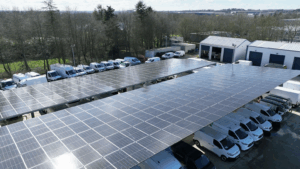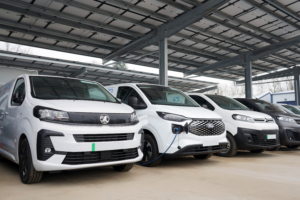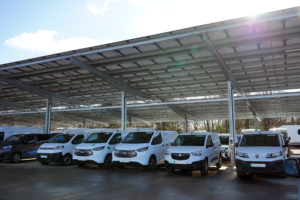Answering Your Electric Van FAQs
Do you have concerns over switching to an electric van fleet within your business? There are so many things to consider before making the big transition, so having concerns is normal.
However, Dawsongroup vans can make this switch easier, and we want to start this process now by answering some of the most frequently asked questions surrounding electric vans.
 1. Are electric vans reliable for everyday use?
1. Are electric vans reliable for everyday use?
One of the biggest concerns for your business fleet is likely to be whether electric vans are reliable for everyday use and ensuring that the introduction to your fleet is cost-effective. Electric vans are reliable for everyday use, especially for city driving or short-to-medium routes. For long-distance drivers, planning routes around charging stations is essential, as range remains lower than diesel alternatives.
2. What are the benefits of switching to an electric van?
There are many benefits of switching to an electric van fleet, including lower running costs, reduced emissions, and quieter operation. With less moving parts than traditional engines, they usually require less maintenance, ensuring lower servicing expenses. Many areas offer tax incentives, grants, and other perks like reduced congestion charges, making electric vans more cost-effective over time.
3. How do electric vans perform in cold weather?
With experiencing plenty of cold weather conditions throughout the UK, an important aspect to consider is whether electric vans perform in cold weather. Colder weather can temporarily reduce battery efficiency and range, as batteries tend to discharge faster in low temperatures. However, most electric vans have built-in features to pre-heat the cabin and battery, which helps mitigate this effect.
4. Are there enough charging stations for electric vans?
The UK’s charging infrastructure is expanding rapidly, with thousands of public charging points installed nationwide and many more planned. Most urban areas now offer accessible charging stations, and major highways feature rapid chargers for longer journeys. However, in rural areas, availability may still be limited, so it’s worth planning charging stops in advance for longer routes.
5. Is switching to electric vans a sustainable choice for my business?
If you’re like us at Dawsongroup and are aiming to reach Net Zero in different ways, including our Dawson Road Decarbonisation Project , switching to electric vans is a sustainable choice for businesses. It supports various sustainability goals by significantly reducing emissions and lowering your carbon footprint. It’s a big change, but with all the benefits, it’s an increasingly viable option for both personal and business use.
There are
 6. How far can electric vans travel on a single charge?
6. How far can electric vans travel on a single charge?
The range of an electric van depends on the model, battery capacity, and driving conditions. Most models offer between 100 to 200 miles per charge, though higher-end options can exceed 200 miles. Factors like load weight, driving speed, and terrain can impact range. Improvements in battery technology are gradually increasing these ranges.
7. How long does it take to charge an electric van?
Charging times vary depending on the charger type:
- Fast Chargers (7-22 kW): Typically found at home or public locations, these can charge a van in 4-8 hours.
- Rapid Chargers (50-100 kW): Found at commercial charging stations, they can charge an electric van to 80% in about 30-60 minutes.
- Slow Chargers (3 kW): Often used at home overnight, these take 12+ hours for a full charge.
Many owners find that combining at-home overnight charging with occasional use of rapid chargers meets most driving needs.
8. How much does it cost to charge an electric van?
Charging costs depend on electricity rates and charging locations. Charging at home is usually the cheapest option, averaging around £10-£15 for a full charge, depending on battery size and electricity rates. Public charging stations may cost more, especially for rapid charging, but they’re still typically cheaper than filling up a tank of fuel. Many businesses benefit from reduced operating costs by using electric fleets.
 9. What is the lifespan of an electric van battery?
9. What is the lifespan of an electric van battery?
Electric van batteries are designed to last 8-10 years or more, with many warranties covering at least 8 years or up to 100,000 miles. Battery degradation occurs gradually, typically losing 1-2% of capacity per year. Battery technology is advancing, and replacement options are becoming more affordable, ensuring the long-term usability of electric vans.
10. Are electric vans eligible for government grants?
Yes, electric vans in the UK are eligible for government grants that can cover up to 35% of the purchase price, capped at a certain amount depending on the van’s size and category. Additionally, many regions offer incentives like reduced road taxes, exemptions from congestion charges, and grants for installing charging infrastructure.
UK Head office
Delaware Drive
Tongwell
Milton Keynes
MK15 8JH

Dawsongroup Limited | Company reg. no. 01902154 (registered in England and Wales)